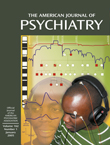Does Sustained-Release Lithium Reduce Impulsive Gambling and Affective Instability Versus Placebo in Pathological Gamblers With Bipolar Spectrum Disorders?
Abstract
OBJECTIVE: Selective serotonin reuptake inhibitors may be effective for some patients with pathological gambling, but those with comorbid conditions, such as bipolar spectrum disorders, may relapse during treatment. To the authors’ knowledge, this is the first placebo-controlled treatment study in pathological gamblers with bipolar spectrum disorders; it compares sustained-release lithium carbonate to placebo. METHOD: Forty pathological gambling patients with bipolar spectrum disorders entered a 10-week randomized, double-blind, placebo-controlled treatment study of sustained-release lithium carbonate. Outcome measures included gambling severity, mood, anxiety, and impulsivity scales. RESULTS: Pathological gambling patients with bipolar spectrum disorders significantly improved while taking sustained-release lithium carbonate compared to placebo on total pathological gambling scores on the Yale-Brown Obsessive Compulsive Scale, including both thoughts/urges and behavior, as well as on the Clinical Global Impression severity of pathological gambling scale. Affective instability (the Clinician-Administered Rating Scale for Mania score) was also lower in the group treated with sustained-release lithium carbonate compared to placebo. Ten (83%) of 12 completers were rated as responders in the sustained-release lithium group versus five (29%) of 17 in the placebo group. Of note, improvement in gambling severity was significantly correlated with improvement in mania ratings. CONCLUSIONS: Sustained-released lithium may be an effective treatment in reducing both gambling behavior and affective instability in pathological gamblers with bipolar spectrum disorder. This study highlights the need to identify subgroups of pathological gambling patients with bipolar spectrum conditions because this may have important treatment implications.



